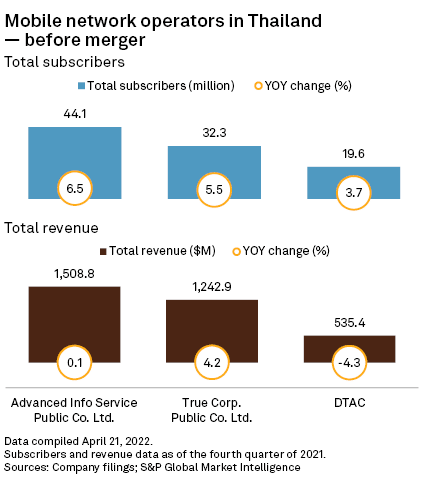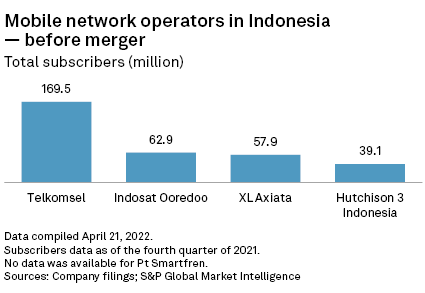S&P Global Offerings
Featured Topics
Featured Products
Events
S&P Global Offerings
Featured Topics
Featured Products
Events
S&P Global Offerings
Featured Topics
Featured Products
Events
Banking & Capital Markets
Economy & Finance
Energy Transition & Sustainability
Technology & Innovation
Podcasts & Newsletters
Banking & Capital Markets
Economy & Finance
Energy Transition & Sustainability
Technology & Innovation
Podcasts & Newsletters
S&P Global Offerings
Featured Topics
Featured Products
Events
12 May, 2022
By Priyanka Boghani and Gaurang Dholakia
Southeast Asia telcos will likely step up tower sales to help pay for 5G upgrades and make further tech investments as the sector settles down after a wave of operator mergers.
Shedding towers is a straightforward way for operators to raise cash for debt reduction and costly 5G investments because the masts appeal to investors, such as pension funds seeking long-term assets with steady revenue streams. That demand saw about 14,000 towers change hands in Indonesia alone last year, while Malaysian operator U Mobile Sdn. Bhd. is now considering a $120 million sale, according to Bloomberg News.
U Mobile did not respond to S&P Global Market Intelligence's request for a comment on the tower sale.
"The sale and leaseback of tower assets is a win-win for both tower companies and telcos," said Nitin Soni, senior director of APAC corporate ratings at Fitch Ratings. Telecoms companies now want "to free up capital to invest in their network and spectrum for 5G," he said.
Operators in Indonesia, Malaysia and Thailand may also boost investment in services such as health tech, as well as in data centers and other physical infrastructure as distractions caused by major operator deals in all three countries fade away. The nations saw $30 billion in total merger announcements last year, led by a mega $15 billion deal in Malaysia, as telcos sought to pare price wars and boost scale for 5G network investments.
Telcos are now interested in smaller deals because they are "looking to diversify their profit pools and expand into adjacent markets," said Kiran Karunakaran, partner at management consultancy Bain & Co. "The digital-platform economy necessitates telcos to look beyond their traditional asset bases and acquire new capabilities."
Tower disposals
Indonesia has seen a flurry of tower deals, and more may follow because of the country's large population and landmass, according to Fitch's Soni. Tower owner PT Dayamitra Telekomunikasi Tbk., also known as Mitratel, plans to use half of the proceeds from its $1.3 billion IPO in November 2021 for acquisitions. The company is a unit of PT Telkom Indonesia, the nation's largest telecom operator.
Tower sales may also start to pick up in Malaysia as the market matures, said Sachin Mittal, head of internet and telecom research at DBS Bank. The country has so far seen fewer deals than Indonesia.
"Malaysia is a market which still needs to develop in terms of its tower fundamentals," Mittal said. "Once the tower sector levels out, we will see more disposals."
The country has seen only one major tower deal recently. Axiata Group Bhd.'s edotco Group Sdn. Bhd. paid $404.7 million to buy tower operator Touch Mindscape Sdn. Bhd., in December 2021. The sale was dwarfed by Indonesia-based deals including Protelindo's acquisition of 6,800 towers from Solusi Tunas Pratama for $1.17 billion last year, and Mitratel's purchase of 4,000 towers from a venture between Telkom Indonesia and Singaporean telecom company Singtel in September 2021. PT Tower Bersama Infrastructure Tbk also bought 3,000 towers from PT Inti Bangun Sejahtera TBk in April 2021.
The potential for tower deals in Thailand has been complicated by legal disputes over concessions. Digital Telecommunications Infrastructure Fund, the nation's first fund targeting the sector, manages 16,059 towers, according to its 2021 annual report. Telcos benefit from working with tower owners as the setup lets them share infrastructure rather than having to build their own facilities.
Tech investments
Operators will likely look to take advantage of the rollout out of 5G networks by investing in services such as health tech, digital finance or entertainment this year and next, Karunakaran said.
Such investments diversify telcos' revenues and potentially help them to retain customers. The strategy may also lure investment from private equity funds, said Omar Maher, a telco analyst at EFG Hermes Research.
"Private equity firms have been interested in the newer, non-traditional parts of the telco model," Maher said. "They will continue to be interested in the Southeast Asian telcos."
Operators in Southeast Asia can now turn to smaller deals, partly because a wave of large-scale combinations has largely run its course.
Malaysia, for instance, is unlikely to see more operator mergers because the government is playing a leading role in developing a common 5G network, according to DBS Bank's Mittal. The country is set to have just four large mobile and fixed broadband suppliers, as Celcom Axiata Bhd. and Telenor ASA's Digi unit are due to complete a $15 billion merger of local operators in the second half of the year. Neither company replied to S&P Global Market Intelligence's request for comment on the deal.

Thailand will soon see its number of operators drop to just two. Total Access Communication PCL's DTAC and True Corp. agreed to merge in February 2022 to help compete with market leader Advanced Info Service PCL.

Indonesia may be the exception as it still has four separate operators, even after the completion of a $6 billion merger between the local units Ooredoo and CK Hutchison Holdings Ltd. in January.
"There is room for further consolidation [in Indonesia] depending on the regulators," said Maher.

